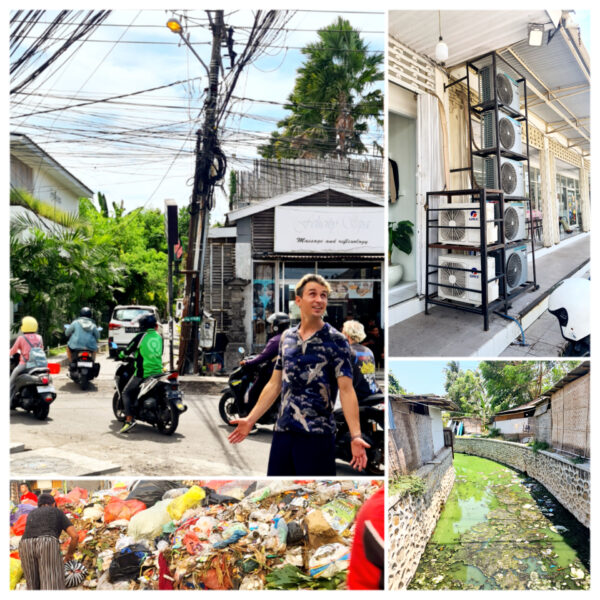“Exploring the intersection of sustainability and rapid development, this post delves into my experiences and observations after relocating to Bali, Indonesia. It’s a call to action for combining European technological insights with local design principles to address crucial issues in energy, waste management, and water conservation.
Move to Bali
It’s been two months since we packed up our stuff and moved to Bali, Indonesia. If you stay for too long in one location, you forget the world is a big place and the issues you see in daily life…aren’t really as big as you thought.
💡Can the developing world look for inspiration in Energy, Waste & Water and transport from the developed world? I mean an inspiration, to learn from the lessons and avoid taking the wrong paths. I think it should, and I would like to explain why.
Indonesia is the world’s fourth most populous country, 15th by landmass and spread over three timezones. This land is in many metrics a success story – the economic growth has brought lots of people out of poverty, life expectancy has been rising steadily and access to basic education is universal. It is also a democracy, with the presidential elections coming soon, and you really notice it on every step.
Rapid developement vs. Sustainability
📈As rapidly as Indonesia is developing, there is much to be desired in making the development sustainable. Most of its energy is fossil, forest fires ale blazing yearly since 2001 and not getting under control. The starting El Niño will not make things better.
⚡Infrastructure – power, water, wastewater, roads. Sometimes it makes you feel, like there are few rules that govern their development.
Is it possible to combine rapid growth with sustainability? Sustainability is, in my opinion, more about design than technology. A technology is in many ways an enabler of design, but it must be used correctly. Sustainability means planning, taking a time to think.
Bali is a place that is rapidly growing. Home to 4.5 million inhabitants and, annually, about as many tourists. As you can expect, the “Island of Gods” suffers from the rate of growth.
Bali infrastructure
Buildings are popping up at a breakneck speed. As are the AC units, keeping them cool, even cold – set to maximum power🥶. There is little thought, or rather action, about designing buildings that require less active cooling. Flat roofs, thin concrete walls, little shading and ventilation, no insulation. Although the traditional design has kept this in mind, new construction seems to omit the logical design elements.
All the electricity required to power the ACs has to be supplied and distributed. I already notice that the supply is unstable, and the high season hasn’t started yet. Most of the electricity, cheap by European standards, is supplied by gas or diesel generators, and imported from Java’s coal fired plants. Rather than expanding the capacity, the demand can be lowered. By design.
Waste water treatment is rudimental, with few centralized installations and most smaller establishments fitted with a cesspit, draining into the surface waters, or infiltrating the soil. As a result, rivers are turned into sewers, stinky and dirty. The coastal waters suffer accordingly. After each rain, it’s better to skip a swim or a surf session. A big shame. 🚱Groundwater from local wells, used for tap water, is not suitable for drinking, unless after RO treatment. Simple grey/black water separation and refitting to aerobic treatment would at least lower the organic loading of surface waters.
🔥Solid waste is an issue that makes it a lot into the media, the largest local landfill burns every year. This year, it was smouldering for several months, until the rainy season started. Sadly, I see every day, how biological waste and garden waste is thrown in the same bins as plastic and brought to the very landfills atop overfilled trucks. In remote areas, with no waste collection, littering is the last resort. Rivers and beaches are a proof. I believe, non-compostable plastic waste could be turned to energy, while the biological waste should be separated and composted.
Research with Udayana University in Denpasar
I don‘t just want to be a part of the problem, but also a part of the solution. 🔬 Beginning of next year, I am starting a research project with Udayana University in Denpasar on the issue of solid waste.
☝️I think, Indonesia can also profit from European technologies, combined with locally appropriate design. The market is present, and the opportunities are endless. Do you have a plan to develop here further and would like to have a technical communicative European on board? I would love to get connected. Since you already read to here, be sure to comment or write. Equally, happy if you spread the word.

